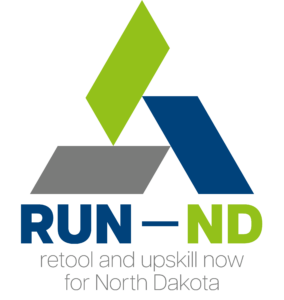02 Apr State Board endorses RUN-ND strategic planning theme
 The North Dakota State Board of Higher Education (SBHE) met at Minot State University’s Harnett Hall in March to continue charting its strategy for the next legislative session. Building off work done through the Envision 2035 strategic planning process, NDUS Chancellor Mark Hagerott proposed a unifying theme for North Dakota higher education initiatives titled RUN-ND or Retool and Upskill Now for North Dakota.
The North Dakota State Board of Higher Education (SBHE) met at Minot State University’s Harnett Hall in March to continue charting its strategy for the next legislative session. Building off work done through the Envision 2035 strategic planning process, NDUS Chancellor Mark Hagerott proposed a unifying theme for North Dakota higher education initiatives titled RUN-ND or Retool and Upskill Now for North Dakota.
The statewide initiative would be “an integrated effort of getting people to basically retool with advanced technology,” Hagerott said. “It is upskilling the existing people we have, and this includes then the pillars of student vitality, the workforce and intelligent machines. This includes the various workforce categories of agriculture, energy, healthcare and also veterans. We have really incorporated veterans and national defense into our strategic planning as it’s evolved over time.”
As relates to student vitality, the Board would focus on fostering a higher education system in which those who go to campus have clear minds, strong bodies and resilient sprits. It also would include initiatives on ways to increase enrollment and student success.
The Board also would focus on building a more productive workforce by expanding academic program availability to more urban and rural areas throughout the state. This would include advocating for an adaptive workforce in the energy, agriculture and healthcare sectors.
During the presentation about the RUN-ND initiative, it was noted that the Georgetown University Center of Education and Workforce recently stated that by 2031, 71 percent of all jobs in North Dakota will require postsecondary training beyond high school.
The third RUN-ND pillar is intelligent machines and a statewide initiative would make AI a tool for all North Dakotans, much like StageNet made broadband internet available for urban and rural communities in the state in the early 90s. The state also would focus on automation using robotics and aviation and increase productivity in the workforce.
“This is what we talked about earlier — the Envision 2035 — all the study groups came out and emerged with digitization as a key ingredient to moving ahead,” said NDUS Vice Chancellor of Strategy Jerry Rostad. “And this is where we developed the concept of a public-private AI.”
NDUS representatives will present the RUN-ND initiative and the Board’s strategic planning to Gov. Doug Burgum during a strategy review at the end of the week.
Committee Actions
Hagerott recommended and the Board approved nominations for the State Board of Agricultural Research and Education (SBARE). The Board is authorized to appoint members who are nominated by the N.D. Ag Coalition (five board members) and the geographic areas represented by NDSU Extension’s multicounty program units (five board members). The SBARE is responsible for budgeting and policy making associated with the North Dakota Agricultural Experiment Station and NDSU Extension.
The two nominees were John Dhuyvetter, who was reappointed to a 4-year term and Mike Clemens, who is a new appointee.
“This entity was created 25 years ago to help prioritize and lead the statewide agricultural enterprise, and this board is also represented on our Envision 2035 (Future of Agriculture) Group,” Hagerott said. “I was able to join one of the one of the Envision 2035 meetings and (Future of Agriculture Group) is very engaged and that’s one of our top workforce priorities in addition to research and education.”
The Board approved a series of requests during the meeting, including tuition exemption requests for several NDUS institutions and authorization of a Bismarck State College Joint Powers Agreement regarding the Bismarck Community Bowl. It also heard updates from the Envision 2035 study groups.
Committee Reports
Vice Chair Dr. John Warford reported for the Academic and Student Affairs Committee. The group heard a report from Bismarck State College regarding bachelor’s degree requests. The group agreed that the Envision 2035 planning process would be the best place to receive further input from the other 10 institutions regarding the request.
Board member Dr. Casey Ryan reported for the Research and Governance Committee. The group discussed the North Dakota Economic Diversification Research Fund and are reviewing several grants. The Governance Committee heard a presentation from Vice Chancellor Darin King regarding an Enterprise Service Management Report, which is given every 6 months.
The Budget and Finance Committee reviewed a tuition waiver report and campus budget report. It also talked about capital budget requests, including tiered capital funding.
Student Member of the Board Sadie Hanson provided an update from the North Dakota Student Association, stating the group passed several resolutions including supporting digital literacy and use of AI in classroom, alternate pathways to teaching licensure, AI and digitization and opposition to sports betting.
Faculty Advisor to the Board Dr. Lisa Montplaisir said campuses are in the middle of Council of College Faculty elections and new officers will be elected this week. She said each campus also is providing feedback on the post-tenure review report.
The Board heard first readings of HR Policies 1 (Introduction), 4 (Probationary Period), Policy 8 (Workers Compensation), 12 (Employment of Relatives) and 24 (Reduction in Force). All policies were approved.
Second readings were heard for Policies 807.1 (Mobbile Phones and Other Mobile Computing Devices; Restrictions on Use of State Phones), 810.1 (Appropriated Funds Reserve) and 512 (Student Drivers and Use of State Vehicles by Student Groups) and all were approved.
No public comments were made.
The Board’s next meeting is scheduled for April 25, 2024.


